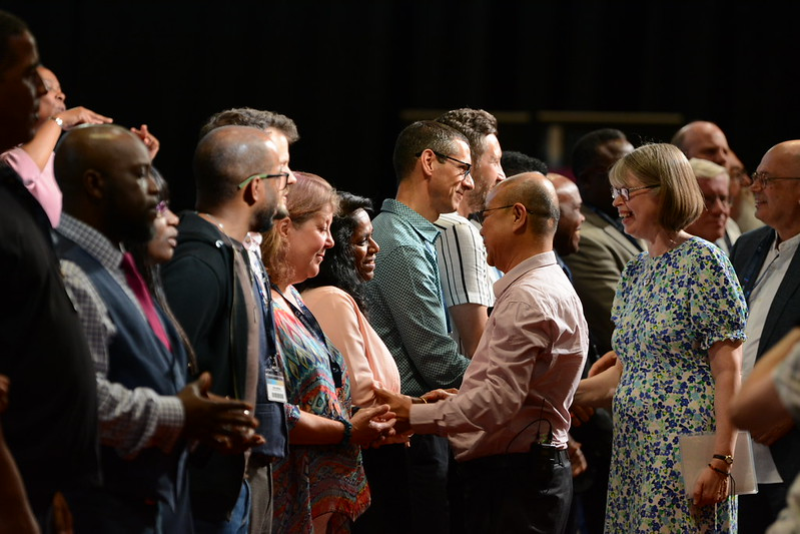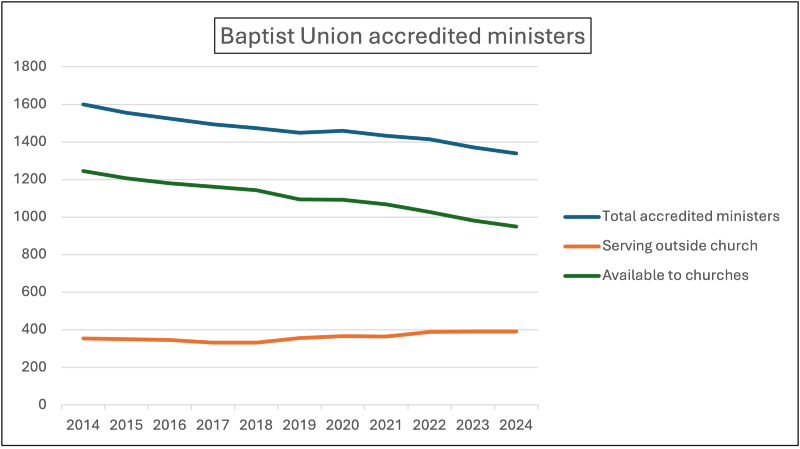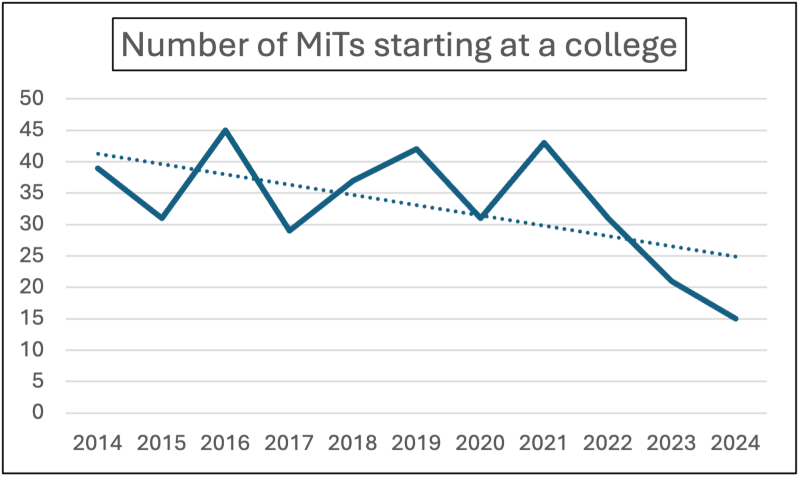More ministers, please!
Part one of a two-part reflection on the challenge - and opportunity - of recovering a healthy supply of ministers for our churches. By Ministries Team Co-Leaders Tim Fergusson and Lee Johnson
(Read part two here)

Baptists have always been committed to the ministry of all God’s people. Churches and mission thrive when every member shares in the task of ministry – serving one another and their communities in a wide variety of spiritual and practical ways.
And yet our history suggests that Baptists have always recognised the value of setting aside some to exercise spiritual oversight. We have long promoted ways of discerning and testing the calling of women and men whom we then equip to be ‘Baptist ministers’ among us.
Most of us reading this will have benefitted from the witness, care, teaching and inspiration provided by an accredited Baptist minister. We know that their ministry has enabled our own.
However, while Jesus continues to call women and men to serve his church and its mission, today Baptists face a sobering reality: fewer and fewer are stepping forward to train for accredited ministry.
This is a challenge, but not just a challenge. It is an opportunity for us to listen afresh to the Spirit and invest in the next generation of leaders and ministers. Imagine the difference if every church became a place where potential calling is noticed, nurtured and resourced. Who in your congregation might God be calling to serve as an accredited minister?
Here are a few statistics: In the last ten years or so, the total number of accredited ministers fell by 16 per cent, excluding those who are retired. Meanwhile, the number of accredited ministers serving in roles outside our churches has risen. Many of them are on the front line of mission and we celebrate their calling.
But it does mean the number of accredited ministers available and to lead, inspire and pastor our churches is down 24 per cent. Though the overall number of churches has also fallen over the same period, churches both large and small are now experiencing the frustration of struggling to attract applicants during a pastoral vacancy.

But a particular concern lies in the recent decline in the number entering training. A total of only 15 people were enrolled as Ministers-in-Training (MiTs) at a Baptist college during 2024. As we approach the end of 2025, we are seeing a modest recovery, but it’s not close to the 50 or so new Ministers-in-Training we are aiming for.

And the average age of those beginning a programme of ministerial formation at one of the Baptist colleges? 44. Up from 38 a decade earlier. We rejoice in those who hear a calling later in their lives to serve Jesus as Baptist ministers. But how we need those who are 18-35 also to respond to a calling to ministry!
The statistics, then, paint a troubling picture, but we believe that with the necessary focus these trends can be reversed. Our aim is to recover a healthy supply of ministers for our churches, church plants, pioneering projects, chaplaincy roles, and children’s and youth ministries, so that our movement may thrive and play its part in God’s mission for decades to come.
The focus would have to be Baptist-wide – a local, regional and national joint effort. It’s no good churches expecting “The Union” to provide a supply of ministers! Those with a calling are first identified, nurtured and commended locally – every church has a responsibility. Those being formed as ministers need both opportunities to lead (and fail, learn and improve) and funds to pay for their training – again, every church has a responsibility. Existing ministers have a part to play too, for they are a key resource in identifying, accompanying and supervising those who go onto train.
So, what might be the obstacles to those wishing to be formed as Baptist ministers, and how can churches help? Here are a few suggestions:
Cost. This is undoubtedly a factor. We celebrate the commitment of our colleges in preparing our ministers by forming their character and providing them with a solid theological framework. But rigorous ministerial formation does not come cheap, and gaining the necessary practice usually requires a Minister-in-Training to be appointed to a part-time paid role as they train. Can your church help fund or foster a Minister-in-Training?
Initial discipleship. Many young people and young adults who have come to faith do not have a Christian heritage and their discipleship starts from scratch. This takes intentionality and time. Has your church considered how it welcomes and develops a generation that is reportedly showing increasing interest in Jesus?
Ageism. Anecdotally, some of those between 18-25 who sense a calling are sometimes told they are too young to train and need life experience first. For sure, life experience is a gift to cherish, but does your church foster a prophetic imagination that says to a young adult with a calling, 'I see in you the potential to serve Jesus as a minister'? And lest you have no young adults in your church, but you do have children and youth, remember that a sense of calling can first emerge even before adulthood.
Under-valuing ministers. Some people look at their own minister and see a person who single-handedly has to ‘run’ the church and then takes all the flak – hardly an encouragement to potential new ministers! If your church is fortunate enough to have a minister, do you treat them well, releasing and resourcing them to practise the habits of Continuing Ministerial Development?
Just as churches and existing ministers have a responsibility to reflect on how they enable men and women discern and follow a calling, so do our Baptist structures – our colleges, obviously – but also our regional associations and the specialist teams at Baptist House. So, the Ministries Team has formed a working group to look at how our pathways to both Recognised Local Ministry and Nationally Accredited Ministry may be better promoted and more accessible in all parts of Baptists Together.
In part two, we will look at some of the ideas the group is working on to address some of the foundational issues. It is clear that there are no quick fixes, but that progress can be made. In the meantime, we can all play our part: Please can we each of us ask, “Who do I know that God might be calling to be a Baptist minister and how can I encourage them?”
Image | Newly Accredited Ministers and lay preachers receive handshakes from BMS World Mission General Director Kang San Tan and Baptist Union General Secretary Lynn Green following their commissioning at the 2023 Baptist Assembly in Telford
Tim Fergusson and Lee Johnson are co-leaders of the Ministries Team.
Read the part two of this reflection, which highlights changes that could contribute to a reversal of the recent trends of a declining number of ministers, here
Do you have a view? Share your thoughts to the Ministries Team here
Baptist Times, 18/11/2025